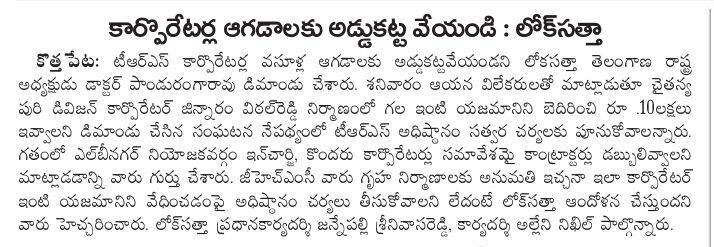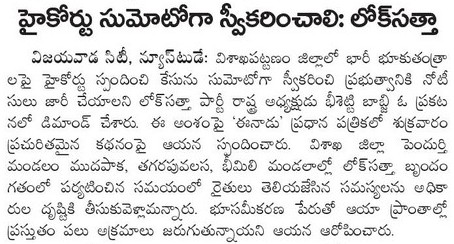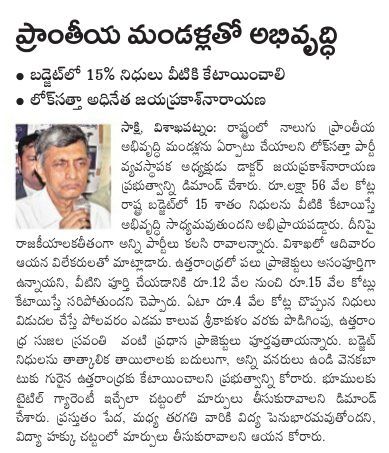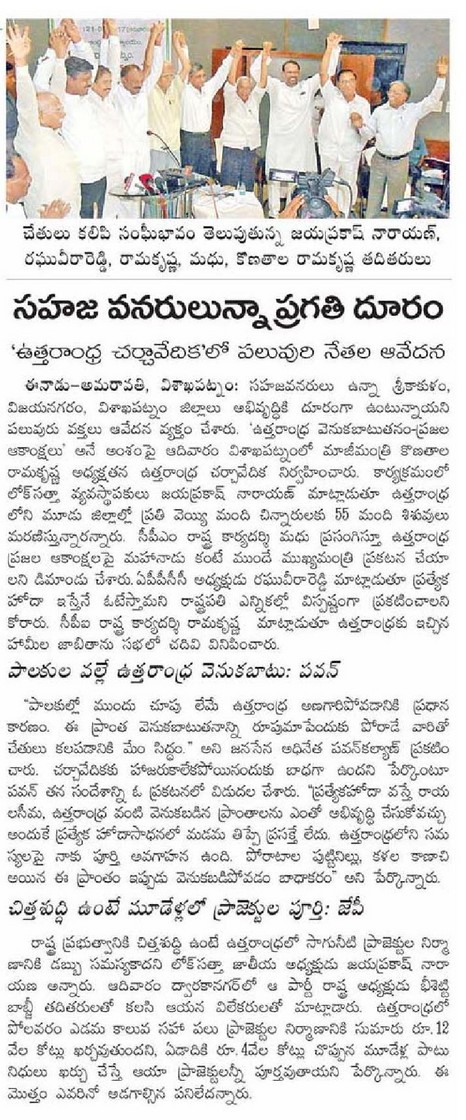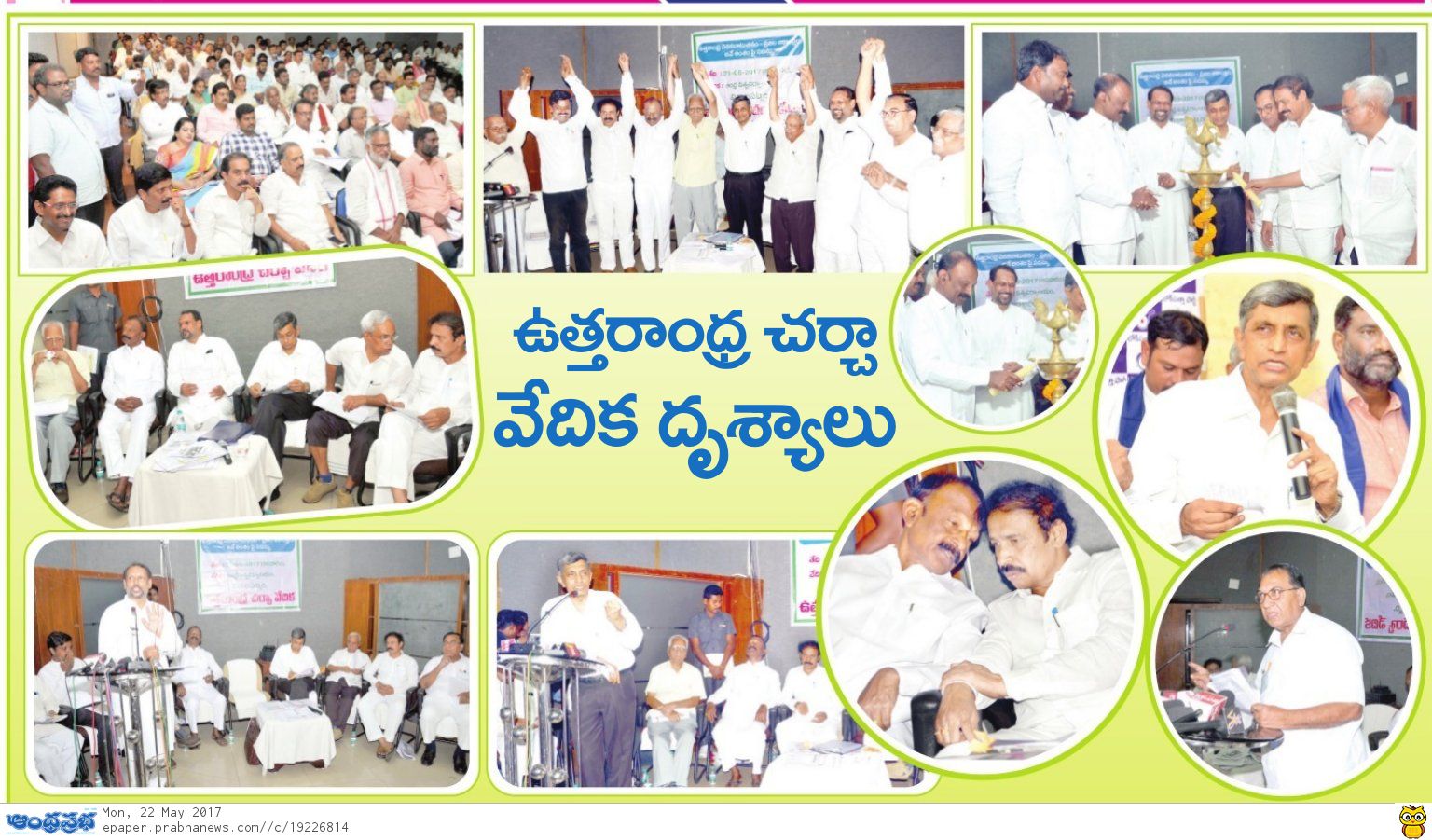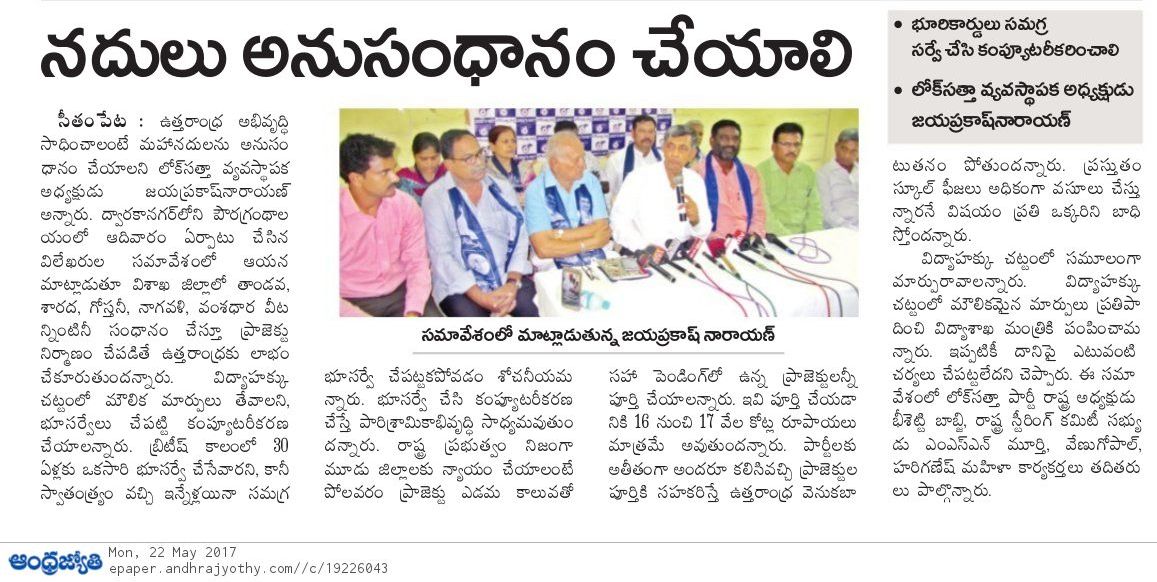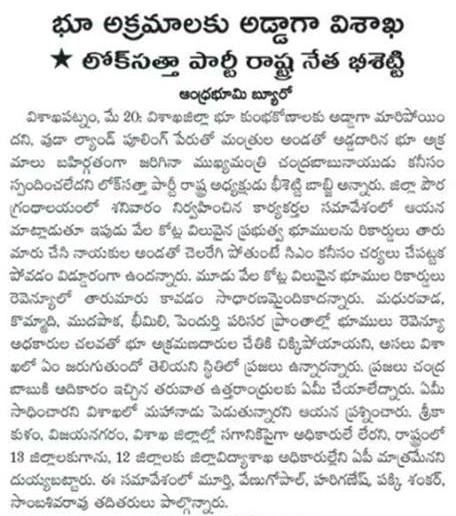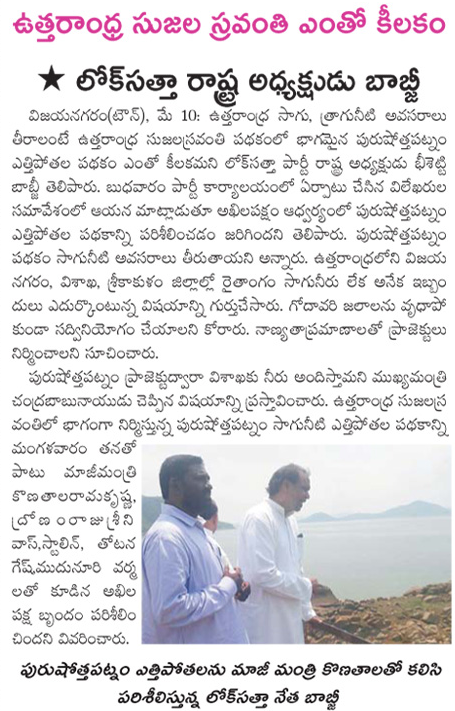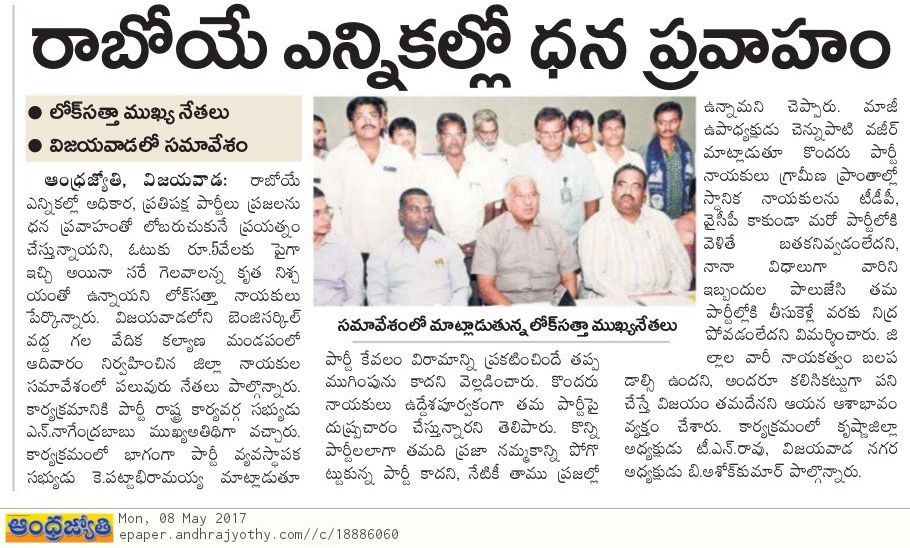Lok Satta Times Jun 1st-15th, 2017 can be downloaded from the following link.
http://ap.loksatta.org/documents/lstimes/lstimes-2017-06-01-15.pdf
Wednesday, May 31, 2017
Monday, May 29, 2017
Saturday, May 27, 2017
Friday, May 26, 2017
JP to attend meeting on poll reforms in Delhi today
It’s time for proportional representation to check the role of money: Lok Satta leader
Lok Satta founder Jayaprakash Narayan will attend a meeting convened by the Parliamentary Committee on election reforms in New Delhi on May 26.
Dr. Narayan, who is also the general secretary of Foundation for Democratic Reforms, in a statement on Thursday said as Lok Satta and FDR had been striving for various election reforms, including proportional representation and direct election of Chief Ministers, the Committee extended an invitation to the meeting.
To submit proposals
The Lok Satta/FDR would submit their draft election reforms’ proposals to the Committee prepared after studying the experiences in various countries and keeping the conditions prevailing in the country in mind. Along with JP, other leaders would also participate in the meeting.
He said election reforms were urgently needed in the country as efficient and honest people were not in a position to contest elections and basic democratic principles were being violated.
Dr. Narayan said purchase of votes was the basic reason for lack of transparency in donations to political parties and increase of black money.
A candidate is declared elected even if he gets one vote more under the existing ‘First Past the Post’ system. Though there was no guarantee that spending money would ensure win, but if a candidate does not spend money, he would not be in a position to given a semblance of a fight. Thus, it is better to adopt proportional representation under which seats would be allotted to a party based on its vote share.
He also said defections and splits in political parties could be curbed by setting up multi-member constituencies to facilitate direct relations between people and people’s representatives. The party which got majority should be given 10% seats as bonus to bring in stability. The proportional representation would be ideal for India with different castes, religions and regions.
The Constitution also made it feasible to shift to proportional representation system through a simple Act, he said.
Lok Satta founder Jayaprakash Narayan will attend a meeting convened by the Parliamentary Committee on election reforms in New Delhi on May 26.
Dr. Narayan, who is also the general secretary of Foundation for Democratic Reforms, in a statement on Thursday said as Lok Satta and FDR had been striving for various election reforms, including proportional representation and direct election of Chief Ministers, the Committee extended an invitation to the meeting.
To submit proposals
The Lok Satta/FDR would submit their draft election reforms’ proposals to the Committee prepared after studying the experiences in various countries and keeping the conditions prevailing in the country in mind. Along with JP, other leaders would also participate in the meeting.
He said election reforms were urgently needed in the country as efficient and honest people were not in a position to contest elections and basic democratic principles were being violated.
Dr. Narayan said purchase of votes was the basic reason for lack of transparency in donations to political parties and increase of black money.
A candidate is declared elected even if he gets one vote more under the existing ‘First Past the Post’ system. Though there was no guarantee that spending money would ensure win, but if a candidate does not spend money, he would not be in a position to given a semblance of a fight. Thus, it is better to adopt proportional representation under which seats would be allotted to a party based on its vote share.
He also said defections and splits in political parties could be curbed by setting up multi-member constituencies to facilitate direct relations between people and people’s representatives. The party which got majority should be given 10% seats as bonus to bring in stability. The proportional representation would be ideal for India with different castes, religions and regions.
The Constitution also made it feasible to shift to proportional representation system through a simple Act, he said.
Courtesy: The Hindu
Thursday, May 25, 2017
Monday, May 22, 2017
Need for time frame to fulfill promises made to N.Andhra
Naidu repeating the mistake of Capital-centric development
Visakhapatnam: The three districts of Srikakulam, Vizianagaram, and Visakhapatnam, collectively referred to as Uttarandhra (North Andhra), remained backward on the education, health, and agriculture fronts despite having all the resources due to the indifference of the successive governments, observed speakers at a meeting organised here on Sunday.
Almost all the assurances pertaining to North Andhra given in Parliament at the time of bifurcation remained mere promises even three years after the ruling parties, the TDP and the BJP, assumed power.
The TDP government in the State was not even sending proposals to the Centre for taking up projects promised to the region even as it was constantly pursuing those in the capital region and undertaking them in the fast-track mode. Chief Minister N. Chandrababu Naidu was bent on repeating his mistake of Capital-centric development, they said.
The speakers demanded that Mr. Naidu announce a definite time frame for completion of the projects promised to North Andhra before the party’s Mahanadu in Visakhapatnam.
Railway zone
APCC president N. Raghuveera Reddy wondered as to what was preventing the Centre from declaring the new railway zone in AP with Visakhapatnam as headquarters.
The 25 issues raised by former Minister Konathala Ramakrishna on the backwardness of Uttarandhra could be solved by implementing the promises made in the AP Reorganisation Act such as granting Special Category Status (SCS) to the State and special package to North Andhra and the backward districts of Rayalaseema.
Mr. Reddy demanded that the Mahanadu declare, as its first resolution, the completion of the projects promised to North Andhra in a fixed time frame.
Lok Satta demand
Lok Satta president Jayaprakash Narayan reeled out statistics to show the high infant mortality, low literacy, low per capita income, and rampant poverty despite a vast coastline and abundant water resources that had not been tapped. He demanded implementation of all projects under the Uttarandhra Sujala Sravathi, extension of Polavaram Left Main canal up to Srikakulam, and linking of the Mahanadi and the Godavari, which could benefit both South Odisha and North Andhra.
Former MP Kanithi Viswanadham of the BJP hoped that a fitting reply would be given to the Chairman of the Railway Board for questioning the need for a new railway zone. CPI State secretary Ramakrishna, CPI(M) State secretary P. Madhu, and former UPSC member K.S. Chalam were among those who spoke.
ఉత్తరాంధ్ర చర్చా వేదిక దృశ్యాలు
Labels:
AndhraPrabha,
telugu
Saturday, May 20, 2017
Wednesday, May 17, 2017
Tuesday, May 16, 2017
Lok Satta Times May 16th-31st, 2017
Lok Satta Times May 16th-31st, 2017 can be downloaded from the following link.
http://ap.loksatta.org/documents/lstimes/lstimes-2017-05-16-31.pdf
http://ap.loksatta.org/documents/lstimes/lstimes-2017-05-16-31.pdf
Monday, May 15, 2017
ఉత్తరాంధ్ర సుజల స్రవంతి ఎంతో కీలకం
Labels:
AndhraBhoomi,
telugu
ప్రభుత్వాల వల్లే వెనుకబాటుతనం
Labels:
AndhraJyothy,
telugu
Thursday, May 11, 2017
Wednesday, May 10, 2017
Monday, May 8, 2017
Friday, May 5, 2017
The Evidence Is Compelling And Conclusive That The RTE Has Failed: JP
Dr Jayaprakash Narayan is the founder of the LokSatta movement and Foundation for Democratic Reforms. He speaks to Shreyas Bharadwaj on how the Right to Education Act was conceived with entirely wrong assumptions and aims, and is harming children’s education, both in public and private schools, and how the people being hurt the most are the poor.
Do you believe that the Right to Education (RTE) Act has been beneficial?
The evidence is very conclusive; it is not even a matter of opinion any longer. I would cite two important pieces of evidence.
The first is about enrolment. While overall enrolment has increased in the past 10-12 years, it is not because of RTE. It is because of a general improvement in enrolment in the country, general prosperity, movements led by NGOs and others, and most of all because of a marked increase in private school enrolment.
The primary aim of the RTE Act is to try and increase enrolment in government schools, right? It is all about standards in government schools, more money, more teachers, better teacher-student ratio, better infrastructure and all those things. But what happened in the past 10 years, after the RTE Act has come into existence? The enrolment in government schools actually fell in absolute numbers by about 11 per cent. And this number is about two years old; today the number may be even worse. And the enrolment in private schools has gone up by 40 per cent. The fact is that after the RTE was enacted, there has been a flight of students from government schools to private schools. You don’t have to prove further, that after spending hundreds of thousands of crores, people have lost further faith in government schooling.
Secondly, be it government or private, the quality of education has deteriorated, or at least there is no evidence of any improvement whatsoever.
The NGO Pratham does a massive nationwide survey of educational outcomes - simple learning outcomes like reading, arithmetic - which are very measurable. That shows an incredibly bleak picture. There is no improvement at all. If anything, actually, there is worsening in some pockets of India. This is both about government schools and private schools. The only deficiency of this data is that it is largely rural.
Then there is the PISA survey conducted by the Organisation for Economic Cooperation and Development. The only time India participated, in 2009, we ranked 73 or 74 in educational outcomes. So there is ample evidence to show that Indian education at the school level is appallingly bad.
Do you think the RTE Act should be repealed?
Absolutely. What the government should do is repeal the Act because it has many deficiencies.
The first is that it focuses only on physical infrastructure and measurements; not on the educational outcomes or the quality of education.
The second is a misplaced sense of idealism. They abolished all examinations and evaluation on the one hand and detention on the other. While it is true that examinations should be stress-free, that there must not be reckless detention and that there must be an opportunity given as far as practicable to the kids to improve themselves so that they can go to the next grade, the notion that you don’t have to measure or evaluate and must promote everyone up to grade 10, without any kind of knowledge is a very dangerous notion. It is hurtful to the poorest of the poor children.
And as a corollary of this, the RTE Act actually says that a child must be admitted to a school for the first time at an age-appropriate level, not at the learning-appropriate level. That means learning is not regarded as an issue at all.
So for all these reasons and the very insanity of trying to bring in a control license raj in the private sector, the RTE Act should go. It only creates profit centres to control the private sector in education, which is very detrimental. We require accountability, standards and monitoring. But we don’t require license raj. It’s a very dangerous model. Therefore, the RTE Act must be repealed and the states must be given autonomy.
Alternatively, the states must be encouraged to enact laws to suit their own requirements and, irrespective of whether or not they are in conformity with the existing RTE Act, the central government must sign up. It must agree to them because it is a concurrent subject. But in one way or another, RTE must be given up in the current form.
The control license raj that you talk about is exclusively applicable to Hindu-run institutions given the 93rd amendment to the Constitution, which says that no minority-run institutions fall under the RTE.
I am no expert on the subject, but from what I understand I will outline. Let me restate the problem.
The problem lies in the application of Article 30 of the Constitution (which says that the state shall not discriminate against any educational institution run by a minority). A Supreme Court bench, headed by then Chief Justice Ramesh Chandra Lahoti went into this issue of minority institutions and privately-run institutions. One of the key issues it examined is whether this right conferred on the minority institutions an exclusive right or is it re-emphasising the fact that minorities will not be discriminated against. And it came to the conclusion that minorities do not get any additional or new rights. The idea is that they cannot be discriminated against because they are minorities.
For instance, Article 30(2), the state shall not, in granting aid to educational institutions, discriminate against any educational institution on the ground that it is under the management of a minority (religious or linguistic). Article 30(1) says that all minorities, whether based on religion or language, shall have the right to establish and administer educational institutions of their choice. But this is not at the cost of the other articles.
That is the reason why even in minority-run engineering and medical schools, the regulatory provisions apply. The idea is, as the Lahoti bench declared, it is a clear reinforcement of the broader vision that there cannot be discrimination against minorities. Instead, bad interpretation both by successive governments and lawmakers and by the courts (except for the Lahoti bench) led to a situation where minorities enjoy special rights that other citizens do not enjoy. It is an absurdity by its very construct. Clearly discriminatory treatment of any group, majority or minority, is wrong. It is counter-productive.
The implementation-related parts of the RTE has been handed over to the National Commission for Protection of Child Rights (NCPCR). This includes Childline and other such social work, which the NCPCR outsources to NGOs which might be of exclusively religious character. We have seen many NGOs which run Childline having members of the priestly order in its administration and workforce; other parts of the same organisations might even run educational institutions. Do you think this would create a cause of conflict of interest?
First of all, centralising education to a level where there is a national commission that will have certain powers is fundamentally wrong. If anything we should move towards decentralisation to a point where there is a district or local level school board which has significant autonomy. Therefore, a model that envisages a government of India body to have that kind of power and that body in turn giving it to some other private entities and they according to their own whims and fancies (even if they are well-meaning) is a wrong approach. It destroys education.
The body established to certify whether a particular institution is of minority character or not, is the National Commission for Minority Education Institutions (NCMEI). According to law, this body cannot have a Hindu member. But a Christian member is allowed to judge on the minority character status of a Muslim institution. Is the NCMEI, in this light, even constitutional?
Parliament has often enacted laws without careful examination. It is self-evidently wrong because blatantly dividing society on caste or communal lines for political gains is a fundamentally dangerous thing for the polity of India. And our politicians have been doing it successively for political gains, short term political gains. But ultimately, and this is the point I want to emphasise, everybody is hurt. All children, whether they belong to minority or majority, linguistic minorities, religious minorities or other minorities or the rest of the children, are affected. The net result is that our education is appallingly bad. We are one of the worst in the world, despite the fact that the demand side is very strong. Society values education. Even the poor people are forced to spend enormous money, disproportionate to their income, and chase education. So, understanding the problem and improving the quality, they have diagnosed it wrong, come up with wrong prescriptions and ended up in damaging education rather than helping education.
One of the imbalances in India’s polity is that religious institutions of minority communities are allowed to establish educational institutions and do a lot of social work while the state has expropriated similar institutions of the majority community. Do you think we should free up those institutions so that they too can do the same?
I have been arguing for it for a long time. Hindu endowments and charitable institutions being controlled by the government is blatantly wrong on two counts. First, this is discrimination against Hindu religious institutions and endowments. Whatever be the religion, the government should stay away; that is what secularism is about. The only problem is the modalities. The ‘how’ of it is going to be complicated because there is no single church in Hinduism. But that is true with Islam and many Christian denominations also. Now that there is a certain situation, you may not be able to do it overnight, but you have to have a road-map, by which the state ultimately is no longer involved in the management of any Hindu religious institution. I am very clear - the state should have no business in that.
The second part relates to endowments other than religious institutions. Even during British India, the law was very very clear. The British always enacted liberal laws about managing charitable organisations. That is why the Societies Act in India (the pre-independence law) is a very liberal law with minimal conditions.
The British actually included political education as a legitimate purpose for forming associations. That means even during the colonial regime, political education is seen as a purpose to which the people can form a society, and you cannot ask questions, the state should not interfere. That is the degree of liberalism exhibited by an alien British government. And under Article 19(1)(c) of the Constitution, all these associations have the freedom to pursue their collective goals. People have the right to form an association. The only regulation if I recall is three-fold - public order, morality and national security. On no other ground can the state regulate any charitable organisation.
Unfortunately, in many states now, the charity commissioner tries to control every facet of your activity. This is absolutely and patently wrong. The United States has what are called 501(c)(3) organisations. I have myself founded an organisation in the United States, primarily to mobilise support from the non-resident Indians about democratic reforms in India. Once we establish the organisation as per the law, you get automatic 100 per cent tax exemption for all the donors in the United States to do good work in India. That is the degree of liberality.
Whereas in India, to do work for India, non-denominational work in education, healthcare or anything else, you don’t get 100 per cent tax exemption. The state’s duty must be to encourage charitable institutions, give them tax incentives. Do not interfere because not only in principle is it wrong but in practice too. The state’s record of interference is terrible. It has not improved anything. The state is not able to manage its educational institutions. They are spectacularly bad. So are the state’s healthcare institutions.
What moral authority does the state have to say that they will come and regulate or monitor or sit in judgement on a day-to-day basis of the charitable institutions of society? If an organisation is misusing the provisions, then take away the tax exemption provision, be tough on that; include criminal provisions. I have no quarrel with that. But the state, in the guise of that, should not regulate.
Talking of the politics of it. What do you think is preventing the central government from taking a look at these sectarian legislations and actually bringing some change?
All governments, notwithstanding what they protest or proclaim, are really the same. They all want control. That this government for two-and-a-half years has not understood the lacunae or the deficiencies or the failings of the RTE Act and is still talking in arguably the most important sector shows that it is not willing to walk the talk. They really don’t want any change. The forces of status quo are very strong. They want control. They don’t want quality outcomes. They don’t want the freedom and choice to people, they don’t want competition between the private sector and public sector. They don’t want to fund education in the low-end private schools for the poor kids.
Do you think some of the intelligentsia who campaigned for the RTE saying it is for the poor, marginalised, the disadvantaged, deserve some blame for the lack of change?
I don’t think that campaigning against the RTE amendments deters the state at all. People like me have argued from the beginning publicly and repeatedly that the RTE is flawed. There are many people who campaigned exposing how bad the law is. So if they are afraid of defenders of the current RTE, why are they not afraid of us? It is a self-serving argument.
And the evidence is so compelling and conclusive that the RTE has failed. What is the problem? Does that mean the state doesn’t care about education? Does it care for only political outcomes?
Let the state say so. "We are afraid because some people will criticise us and we don’t care about the children’s education". Let the state not pretend that it cares for children’s education.
Do you believe that the Right to Education (RTE) Act has been beneficial?
The evidence is very conclusive; it is not even a matter of opinion any longer. I would cite two important pieces of evidence.
The first is about enrolment. While overall enrolment has increased in the past 10-12 years, it is not because of RTE. It is because of a general improvement in enrolment in the country, general prosperity, movements led by NGOs and others, and most of all because of a marked increase in private school enrolment.
The primary aim of the RTE Act is to try and increase enrolment in government schools, right? It is all about standards in government schools, more money, more teachers, better teacher-student ratio, better infrastructure and all those things. But what happened in the past 10 years, after the RTE Act has come into existence? The enrolment in government schools actually fell in absolute numbers by about 11 per cent. And this number is about two years old; today the number may be even worse. And the enrolment in private schools has gone up by 40 per cent. The fact is that after the RTE was enacted, there has been a flight of students from government schools to private schools. You don’t have to prove further, that after spending hundreds of thousands of crores, people have lost further faith in government schooling.
Secondly, be it government or private, the quality of education has deteriorated, or at least there is no evidence of any improvement whatsoever.
The NGO Pratham does a massive nationwide survey of educational outcomes - simple learning outcomes like reading, arithmetic - which are very measurable. That shows an incredibly bleak picture. There is no improvement at all. If anything, actually, there is worsening in some pockets of India. This is both about government schools and private schools. The only deficiency of this data is that it is largely rural.
Then there is the PISA survey conducted by the Organisation for Economic Cooperation and Development. The only time India participated, in 2009, we ranked 73 or 74 in educational outcomes. So there is ample evidence to show that Indian education at the school level is appallingly bad.
Do you think the RTE Act should be repealed?
Absolutely. What the government should do is repeal the Act because it has many deficiencies.
The first is that it focuses only on physical infrastructure and measurements; not on the educational outcomes or the quality of education.
The second is a misplaced sense of idealism. They abolished all examinations and evaluation on the one hand and detention on the other. While it is true that examinations should be stress-free, that there must not be reckless detention and that there must be an opportunity given as far as practicable to the kids to improve themselves so that they can go to the next grade, the notion that you don’t have to measure or evaluate and must promote everyone up to grade 10, without any kind of knowledge is a very dangerous notion. It is hurtful to the poorest of the poor children.
And as a corollary of this, the RTE Act actually says that a child must be admitted to a school for the first time at an age-appropriate level, not at the learning-appropriate level. That means learning is not regarded as an issue at all.
So for all these reasons and the very insanity of trying to bring in a control license raj in the private sector, the RTE Act should go. It only creates profit centres to control the private sector in education, which is very detrimental. We require accountability, standards and monitoring. But we don’t require license raj. It’s a very dangerous model. Therefore, the RTE Act must be repealed and the states must be given autonomy.
Alternatively, the states must be encouraged to enact laws to suit their own requirements and, irrespective of whether or not they are in conformity with the existing RTE Act, the central government must sign up. It must agree to them because it is a concurrent subject. But in one way or another, RTE must be given up in the current form.
The control license raj that you talk about is exclusively applicable to Hindu-run institutions given the 93rd amendment to the Constitution, which says that no minority-run institutions fall under the RTE.
I am no expert on the subject, but from what I understand I will outline. Let me restate the problem.
The problem lies in the application of Article 30 of the Constitution (which says that the state shall not discriminate against any educational institution run by a minority). A Supreme Court bench, headed by then Chief Justice Ramesh Chandra Lahoti went into this issue of minority institutions and privately-run institutions. One of the key issues it examined is whether this right conferred on the minority institutions an exclusive right or is it re-emphasising the fact that minorities will not be discriminated against. And it came to the conclusion that minorities do not get any additional or new rights. The idea is that they cannot be discriminated against because they are minorities.
For instance, Article 30(2), the state shall not, in granting aid to educational institutions, discriminate against any educational institution on the ground that it is under the management of a minority (religious or linguistic). Article 30(1) says that all minorities, whether based on religion or language, shall have the right to establish and administer educational institutions of their choice. But this is not at the cost of the other articles.
That is the reason why even in minority-run engineering and medical schools, the regulatory provisions apply. The idea is, as the Lahoti bench declared, it is a clear reinforcement of the broader vision that there cannot be discrimination against minorities. Instead, bad interpretation both by successive governments and lawmakers and by the courts (except for the Lahoti bench) led to a situation where minorities enjoy special rights that other citizens do not enjoy. It is an absurdity by its very construct. Clearly discriminatory treatment of any group, majority or minority, is wrong. It is counter-productive.
The implementation-related parts of the RTE has been handed over to the National Commission for Protection of Child Rights (NCPCR). This includes Childline and other such social work, which the NCPCR outsources to NGOs which might be of exclusively religious character. We have seen many NGOs which run Childline having members of the priestly order in its administration and workforce; other parts of the same organisations might even run educational institutions. Do you think this would create a cause of conflict of interest?
First of all, centralising education to a level where there is a national commission that will have certain powers is fundamentally wrong. If anything we should move towards decentralisation to a point where there is a district or local level school board which has significant autonomy. Therefore, a model that envisages a government of India body to have that kind of power and that body in turn giving it to some other private entities and they according to their own whims and fancies (even if they are well-meaning) is a wrong approach. It destroys education.
The body established to certify whether a particular institution is of minority character or not, is the National Commission for Minority Education Institutions (NCMEI). According to law, this body cannot have a Hindu member. But a Christian member is allowed to judge on the minority character status of a Muslim institution. Is the NCMEI, in this light, even constitutional?
Parliament has often enacted laws without careful examination. It is self-evidently wrong because blatantly dividing society on caste or communal lines for political gains is a fundamentally dangerous thing for the polity of India. And our politicians have been doing it successively for political gains, short term political gains. But ultimately, and this is the point I want to emphasise, everybody is hurt. All children, whether they belong to minority or majority, linguistic minorities, religious minorities or other minorities or the rest of the children, are affected. The net result is that our education is appallingly bad. We are one of the worst in the world, despite the fact that the demand side is very strong. Society values education. Even the poor people are forced to spend enormous money, disproportionate to their income, and chase education. So, understanding the problem and improving the quality, they have diagnosed it wrong, come up with wrong prescriptions and ended up in damaging education rather than helping education.
One of the imbalances in India’s polity is that religious institutions of minority communities are allowed to establish educational institutions and do a lot of social work while the state has expropriated similar institutions of the majority community. Do you think we should free up those institutions so that they too can do the same?
I have been arguing for it for a long time. Hindu endowments and charitable institutions being controlled by the government is blatantly wrong on two counts. First, this is discrimination against Hindu religious institutions and endowments. Whatever be the religion, the government should stay away; that is what secularism is about. The only problem is the modalities. The ‘how’ of it is going to be complicated because there is no single church in Hinduism. But that is true with Islam and many Christian denominations also. Now that there is a certain situation, you may not be able to do it overnight, but you have to have a road-map, by which the state ultimately is no longer involved in the management of any Hindu religious institution. I am very clear - the state should have no business in that.
The second part relates to endowments other than religious institutions. Even during British India, the law was very very clear. The British always enacted liberal laws about managing charitable organisations. That is why the Societies Act in India (the pre-independence law) is a very liberal law with minimal conditions.
The British actually included political education as a legitimate purpose for forming associations. That means even during the colonial regime, political education is seen as a purpose to which the people can form a society, and you cannot ask questions, the state should not interfere. That is the degree of liberalism exhibited by an alien British government. And under Article 19(1)(c) of the Constitution, all these associations have the freedom to pursue their collective goals. People have the right to form an association. The only regulation if I recall is three-fold - public order, morality and national security. On no other ground can the state regulate any charitable organisation.
Unfortunately, in many states now, the charity commissioner tries to control every facet of your activity. This is absolutely and patently wrong. The United States has what are called 501(c)(3) organisations. I have myself founded an organisation in the United States, primarily to mobilise support from the non-resident Indians about democratic reforms in India. Once we establish the organisation as per the law, you get automatic 100 per cent tax exemption for all the donors in the United States to do good work in India. That is the degree of liberality.
Whereas in India, to do work for India, non-denominational work in education, healthcare or anything else, you don’t get 100 per cent tax exemption. The state’s duty must be to encourage charitable institutions, give them tax incentives. Do not interfere because not only in principle is it wrong but in practice too. The state’s record of interference is terrible. It has not improved anything. The state is not able to manage its educational institutions. They are spectacularly bad. So are the state’s healthcare institutions.
What moral authority does the state have to say that they will come and regulate or monitor or sit in judgement on a day-to-day basis of the charitable institutions of society? If an organisation is misusing the provisions, then take away the tax exemption provision, be tough on that; include criminal provisions. I have no quarrel with that. But the state, in the guise of that, should not regulate.
Talking of the politics of it. What do you think is preventing the central government from taking a look at these sectarian legislations and actually bringing some change?
All governments, notwithstanding what they protest or proclaim, are really the same. They all want control. That this government for two-and-a-half years has not understood the lacunae or the deficiencies or the failings of the RTE Act and is still talking in arguably the most important sector shows that it is not willing to walk the talk. They really don’t want any change. The forces of status quo are very strong. They want control. They don’t want quality outcomes. They don’t want the freedom and choice to people, they don’t want competition between the private sector and public sector. They don’t want to fund education in the low-end private schools for the poor kids.
Do you think some of the intelligentsia who campaigned for the RTE saying it is for the poor, marginalised, the disadvantaged, deserve some blame for the lack of change?
I don’t think that campaigning against the RTE amendments deters the state at all. People like me have argued from the beginning publicly and repeatedly that the RTE is flawed. There are many people who campaigned exposing how bad the law is. So if they are afraid of defenders of the current RTE, why are they not afraid of us? It is a self-serving argument.
And the evidence is so compelling and conclusive that the RTE has failed. What is the problem? Does that mean the state doesn’t care about education? Does it care for only political outcomes?
Let the state say so. "We are afraid because some people will criticise us and we don’t care about the children’s education". Let the state not pretend that it cares for children’s education.
Labels:
english
Thursday, May 4, 2017
నల్లడబ్బు లేకుండా 'ఒకే ఎన్నిక'
Labels:
AndhraJyothy,
telugu
Monday, May 1, 2017
Lok Satta Times May 1st-15th, 2017
Lok Satta Times May 1st-15th, 2017 can be downloaded from the following link.
http://ap.loksatta.org/documents/lstimes/lstimes-2017-05-01-15.pdf
http://ap.loksatta.org/documents/lstimes/lstimes-2017-05-01-15.pdf
Subscribe to:
Posts (Atom)


